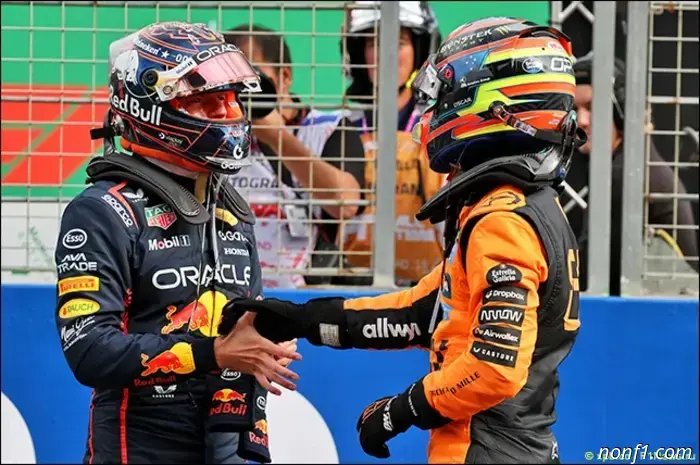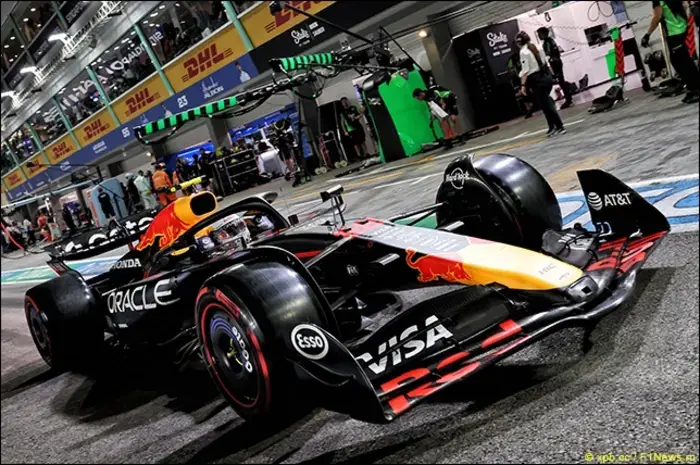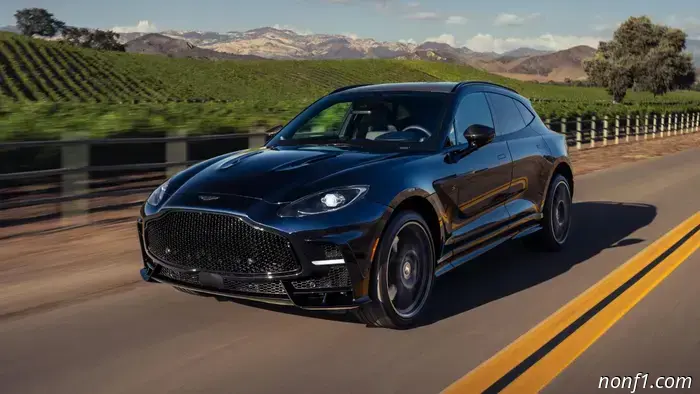
Статистика предыдущих Гран-при: Гонки и участники.
Статистика выступлений гонщиков в прошедших Гран При отсортирована по средней позиции на финише в тех гонках, где пилот был классифицирован. Если гонщик не принимал участия или сошел с дистанции, эта гонка не учитывается в его средней позиции.
Гонщик
Команда
позиция на финише
лидирование
общая дистанция
сред
лучш
круги
км
круги
время
км
%
О.Пиастри
McLaren
2,5
1
394
2075,4
1030
25:53:08
5162,6
95,3%
М.Ферстаппен
Red Bull
3,5
1
281
1496,7
1011
26:06:21
5166,0
93,5%
Л.Норрис
McLaren
4,0
1
241
1109,9
1069
27:06:55
5417,2
98,9%
Д.Расселл
Mercedes
4,4
1
103
483,0
1079
27:32:21
5462,0
99,8%
Ш.Леклер
Ferrari
5,3
2
48
223,9
1005
25:31:20
5078,3
93,0%
Л.Хэмилтон
Ferrari
6,7
4
2
9,5
974
25:52:58
4946,1
90,1%
К.Антонелли
Mercedes
8,6
3
11
62,1
946
24:31:20
4827,0
87,5%
А.Элбон
Williams
8,6
5
1
5,5
959
25:05:02
4928,5
88,7%
А.Хаджар
Racing Bulls
10,5
3
-
-
994
24:51:55
4984,6
92,0%
Ф.Алонсо
Aston Martin
10,5
5
-
-
931
23:55:32
4735,4
86,1%
К.Сайнс
Williams
10,9
3
-
-
937
25:44:21
4779,9
86,7%
Л.Лоусон
Red Bull / Racing Bulls
11,3
5
-
-
978
24:48:41
4908,4
90,5%
Л.Берман
Haas F1
11,5
6
-
-
1025
26:25:24
5194,6
94,8%
Н.Хюлкенберг
Sauber
12,2
3
-
-
963
24:45:23
4816,4
89,1%
Ю.Цунода
Racing Bulls / Red Bull
12,5
6
-
-
1023
26:18:01
5125,8
94,6%
Э.Окон
Haas F1
12,5
5
-

Другие статьи
 DHL Награда за самый быстрый пит-стоп: Red Bull с лучшим пит-стопом
В Сингапуре механики Red Bull Racing совершили самый быстрый пит-стоп, обслужив машину Юки Цуноды за 2.05 секунды.
DHL Награда за самый быстрый пит-стоп: Red Bull с лучшим пит-стопом
В Сингапуре механики Red Bull Racing совершили самый быстрый пит-стоп, обслужив машину Юки Цуноды за 2.05 секунды.
 Вот почему пока нет серийного внедорожника, способного разгоняться до 200 миль в час.
В мире, где производители суперкаров выпускают высокопроизводительные внедорожники, почему ни один из них ещё не рассчитан на 200 миль в час? Физика.
Вот почему пока нет серийного внедорожника, способного разгоняться до 200 миль в час.
В мире, где производители суперкаров выпускают высокопроизводительные внедорожники, почему ни один из них ещё не рассчитан на 200 миль в час? Физика.
 Лео Турини: Это не может продолжаться дальше.
После Гран-при Сингапура общее настроение фанатов Ferrari охарактеризовал Лео Турини, опытный итальянский гоночный журналист...
Лео Турини: Это не может продолжаться дальше.
После Гран-при Сингапура общее настроение фанатов Ferrari охарактеризовал Лео Турини, опытный итальянский гоночный журналист...
 According to JD Power data, the leading brand in one segment boasts an impressive 67 percent loyalty rate.
JD Power’s recent study reveals which brands enjoy the highest customer loyalty.
Porsche leads the premium car segment, while Toyota ranks at the top of the mainstream car category.
Ford trucks hold a loyalty rate of 66.6%, significantly higher than the industry average of only 49%.
Attracting customers presents merely one challenge for automakers. A more significant and crucial task lies in retaining those customers, encouraging them to return when they decide to change vehicles, influenced by their trust in the brand and the perceived value and quality of the engineering that supports it. This can be a struggle for some companies, while others excel in this aspect, as highlighted by a new study.
JD Power's annual Automotive Brand Loyalty Study, released this week, underscores the brands that seem to have customers tethered with elastic bands.
Which Brands Keep Drivers Coming Back?
The study categorizes vehicles into segments, showcasing a broad array of winners from domestic, Asian, and European brands. All of these brands share loyalty rates that significantly exceed the industry average of just 49%.
Despite Porsche facing declining sales in China, where local automakers are gaining traction, its customer base in the US remains loyal. The study states that Porsche has a loyalty rating of 58.2 percent, leading the premium car segment and outpacing second-place Mercedes, which scored 49.7 percent.
Luxury Versus Everyday Leaders
In the premium SUV category, Lexus secured the top slot with a loyalty rate of 57.4 percent, surpassing BMW, which registered 54 percent. However, neither brand could rival Toyota's loyalty score of 62 percent in the mass market car segment, making even Porsche's customers appear less committed.
JD Power Automotive Brand Loyalty Study
Honda recorded a loyalty rate of 55.5 percent in the car category but excelled in the mainstream SUV segment with its own rate of 62 percent. Subaru followed closely with an impressive 60.6 percent.
Ford's Loyal Customers
One brand stands out with a loyalty rate that seems reminiscent of automakers operating in Eastern Europe prior to the fall of the wall. This brand is Ford, which dominated the truck category with a remarkable 66.6 percent loyalty rate, surpassing Toyota, which came in second at 61.2 percent.
JD Power highlights that brand loyalty often decreases when customers transition to different segments. It’s likely that Ford’s success can be attributed to the fact that its F-Series customers are creatures of habit, committing to their F-150s for life.
Статистика результатов гонщиков в квалификациях...
According to JD Power data, the leading brand in one segment boasts an impressive 67 percent loyalty rate.
JD Power’s recent study reveals which brands enjoy the highest customer loyalty.
Porsche leads the premium car segment, while Toyota ranks at the top of the mainstream car category.
Ford trucks hold a loyalty rate of 66.6%, significantly higher than the industry average of only 49%.
Attracting customers presents merely one challenge for automakers. A more significant and crucial task lies in retaining those customers, encouraging them to return when they decide to change vehicles, influenced by their trust in the brand and the perceived value and quality of the engineering that supports it. This can be a struggle for some companies, while others excel in this aspect, as highlighted by a new study.
JD Power's annual Automotive Brand Loyalty Study, released this week, underscores the brands that seem to have customers tethered with elastic bands.
Which Brands Keep Drivers Coming Back?
The study categorizes vehicles into segments, showcasing a broad array of winners from domestic, Asian, and European brands. All of these brands share loyalty rates that significantly exceed the industry average of just 49%.
Despite Porsche facing declining sales in China, where local automakers are gaining traction, its customer base in the US remains loyal. The study states that Porsche has a loyalty rating of 58.2 percent, leading the premium car segment and outpacing second-place Mercedes, which scored 49.7 percent.
Luxury Versus Everyday Leaders
In the premium SUV category, Lexus secured the top slot with a loyalty rate of 57.4 percent, surpassing BMW, which registered 54 percent. However, neither brand could rival Toyota's loyalty score of 62 percent in the mass market car segment, making even Porsche's customers appear less committed.
JD Power Automotive Brand Loyalty Study
Honda recorded a loyalty rate of 55.5 percent in the car category but excelled in the mainstream SUV segment with its own rate of 62 percent. Subaru followed closely with an impressive 60.6 percent.
Ford's Loyal Customers
One brand stands out with a loyalty rate that seems reminiscent of automakers operating in Eastern Europe prior to the fall of the wall. This brand is Ford, which dominated the truck category with a remarkable 66.6 percent loyalty rate, surpassing Toyota, which came in second at 61.2 percent.
JD Power highlights that brand loyalty often decreases when customers transition to different segments. It’s likely that Ford’s success can be attributed to the fact that its F-Series customers are creatures of habit, committing to their F-150s for life.
Статистика результатов гонщиков в квалификациях...
Статистика предыдущих Гран-при: Гонки и участники.
Статистика результатов пилотов на прошедших Гран-при...
